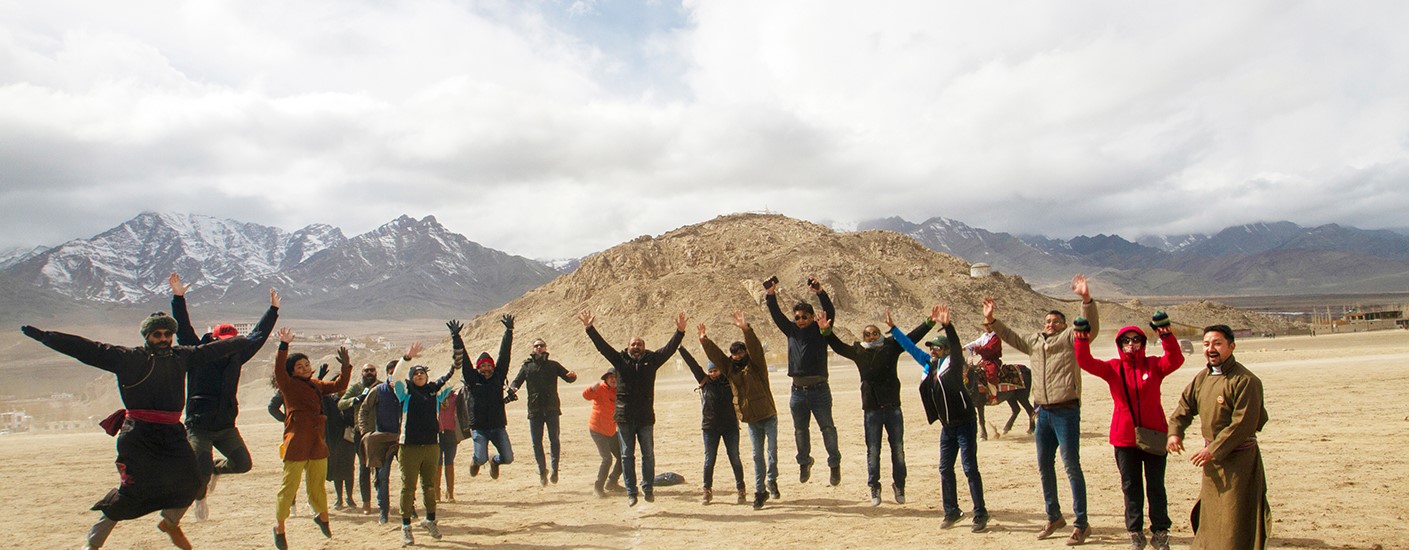Extraordinary Experiences. Exclusively Designed.
{ Our friendly front desk team will assist you with every detail }
Ladakh is a land for all seasons, and we at The Grand Dragon Ladakh welcome travellers to immerse themselves in its ancient culture, peaceful monasteries and stunning landscapes.Known as the “Roof of the World,” it boasts of high-altitude roads leading to mesmerizing destinations like Nubra Valley, Lamayuru, Pangong & Tsomoriri lakes, and Buddhist monasteries such as Alchi, Thiksey, and Hemis. Picture-perfect spots like the Sangam- the confluence of the Zanskar and Indus rivers, apricot blossoms during season, chortens that dot the landscape, and peaceful riverside picnics take you to a Ladakh, far beyond the tourist spots made famous by the Bollywood film Three Idiots.
Photographers find endless inspiration here, while stargazers are captivated by Hanle's dark sky reserve. For the thrill seekers, adventure calls for rafting, trekking, rock climbing, motorbike rallies, camping by the lakes, hiking in the summer and ice skating and ice hockey in the winter.. Culture lovers can walk the revered Buddhist trail and meet nomadic tribes known for their breeding goats that produce the very warm Ladakhi pashmina- the finest and currently the most expensive wool in the world.
Beyond its stunning surroundings, the hotel provides an ideal retreat with its warm hospitality, personalized service, and a seamless blend of heritage and modern comforts. Guests can unwind at the Hammam Wellness & Spa by L'OCCITANE, enjoy a game of billiards, or indulge in experiences like picnics and barbeques set against the backdrop of the majestic Stok Kangri range. Local markets showcase vibrant coral jewelry, intricate metal and woodwork, masks, and Tibetan bric-à-brac.
Committed to sustainable tourism, the hotel actively promotes local craftsmen and art with a plethora of handpicked activities to choose from. There will never be an idle day when you are in Ladakh.
For The Grand Dragon Ladakh experience beyond Leh, check with the hotel concierge or when making your reservations for day return and overnight trips in well equipped four wheel drives.

The Grand Dragon recommends
Picturesque Picnics
Imagine savoring a delightful breakfast or lunch amidst the tranquil beauty of Ladakh's riverscapes. The Grand Dragon crafts customised riverside picnic experiences with picturesque setups by the waters of the Indus or Zanskar rivers. Whether nestled near the charming villages of Chushoot or Phey, or in the serene shadow of a mountainside monastery, each location is a feast for the senses—where every delectable morsel is accompanied by invigorating outdoors and postcard-perfect views.
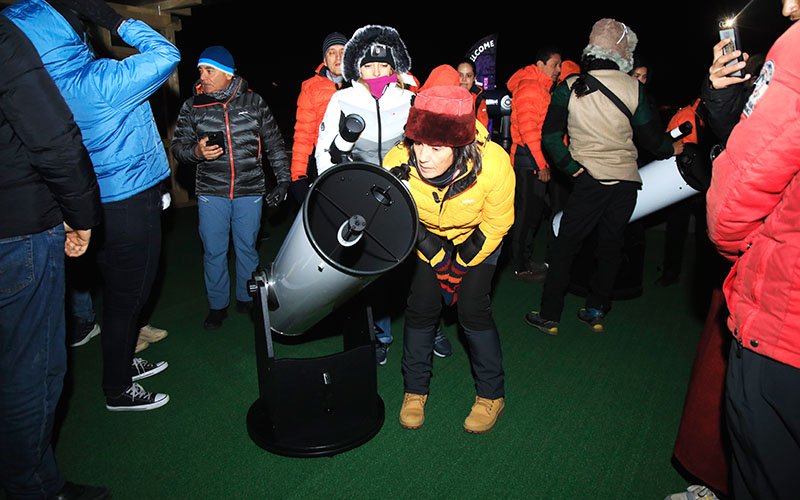
The Grand Dragon recommends
Celestial Sojourn
Marvel at Ladakh’s night skies with an open-air stargazing session with Astroport. Located on the roof of the hotel, this awe-inspiring celestial adventure featuring telescopic observations is guided by an expert with professional telescopes, to spot the constellations, planets, and countless stars twinkling in the pristine Himalayan sky.
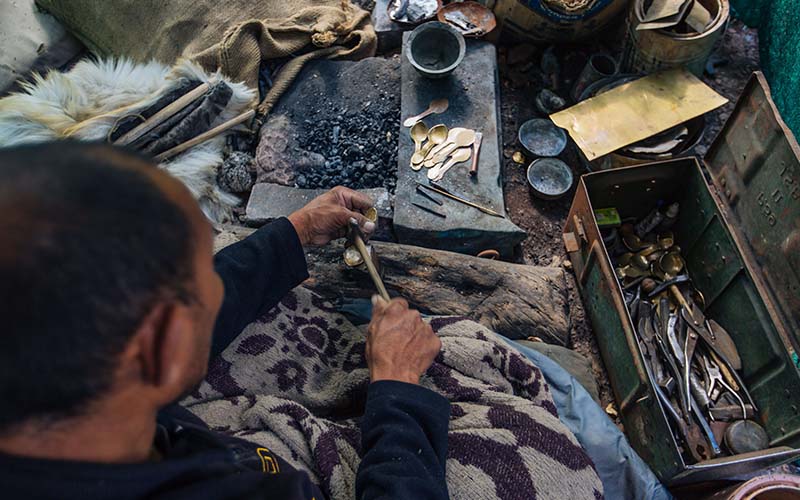
The Grand Dragon recommends
Molten Masters
Explore the timeless artistry of Chilling, a quaint village near Nimmu (60 km from Leh), renowned for its centuries-old tradition Meet skilled Himalayan artisans who have supplied exquisite copper works to the Leh market for generations. Witness their intricate creations and join hands-on workshops to help preserve this remarkable 500 year old legacy. Complete the day with a delightful picnic by the Zanskar River.
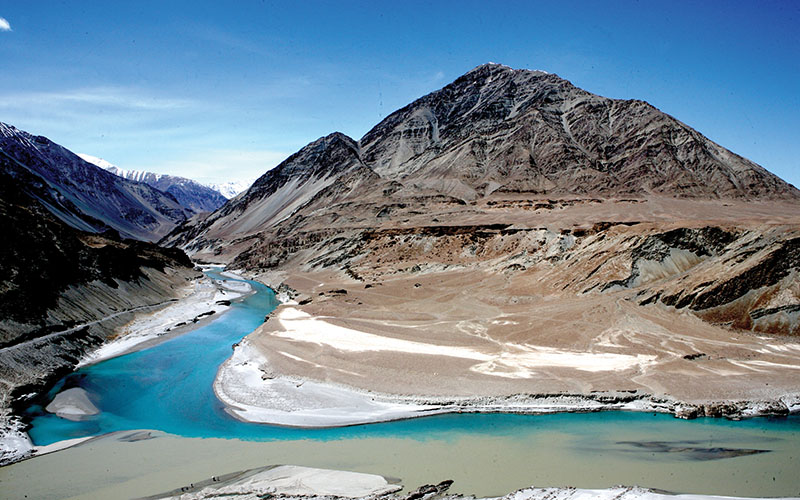
The Signature Confluence
The Zanskar-Indus Confluence or Sangam , where the emerald river Indus meets the vibrant blue Zanskar river, is a mesmerizing sight on the outskirts of Leh. The rivers change colours through the seasons and in the winter they are at their brightest cerulean blue .Surrounded by rugged mountains, this natural wonder offers scenic views and is a popular spot for photography and rafting adventures.
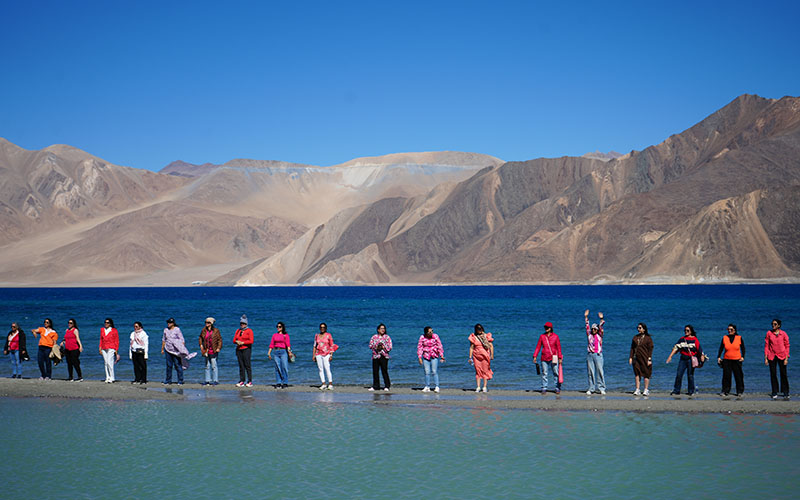
Stunning Pangong
A perfect day trip [308 kms] for those who love the blues, Pangong Lake is an absolute visual treat perched at 4,350 meters A long narrow basin of inland drainage , it affords spectacular views of the rugged mountains and their reflection shimmering in the ever-changing blues and greens of the lake's brackish water..
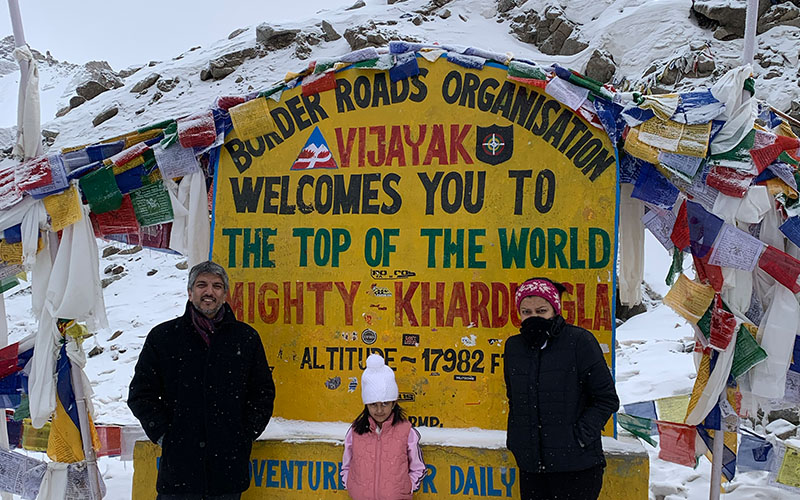
Thrilling KhardungLa
Another exciting day excursion [90 kms] is to Khardung La, one of the world’s highest motorable passes at 5,359 meters, is the gateway to the stunningspan Nubra and Shyok Valleys. Surrounded by snow-clad peaks, it promises the most thrilling drive, making it a must-visit for adventure seekers in Ladakh.
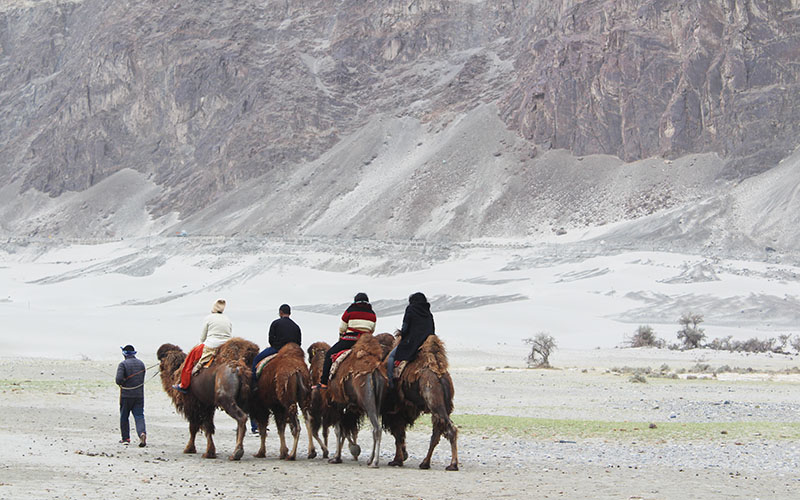
Charming Nubra
Nubra Valley, located 150 kilometers north of Leh,is a 5-6 hours drive to a unique and stunning region known for its dramatic landscapes, high-altitude desert, and rich cultural heritage. Plan for 2-3 days to visit the famous Diskit Monastery, founded in the 14th century that houses a 32-meter (106 feet) statue of Maitreya Buddha. The unique Hunder Sand Dunes are situated here and are also popular for rides on the double-humped Bactrian camels that were once part of the Silk Road trade route. In addition, close to the Indo-Pak border lies the picturesque Turtuk Village with its distinct Balti culture, offering a unique cultural experience and a glimpse into the life of the Balti people. Also located near the Sumur village in the valley is the hidden, sacred and serene Yarab Tso Lake known for its stunning views and a serene atmosphere.
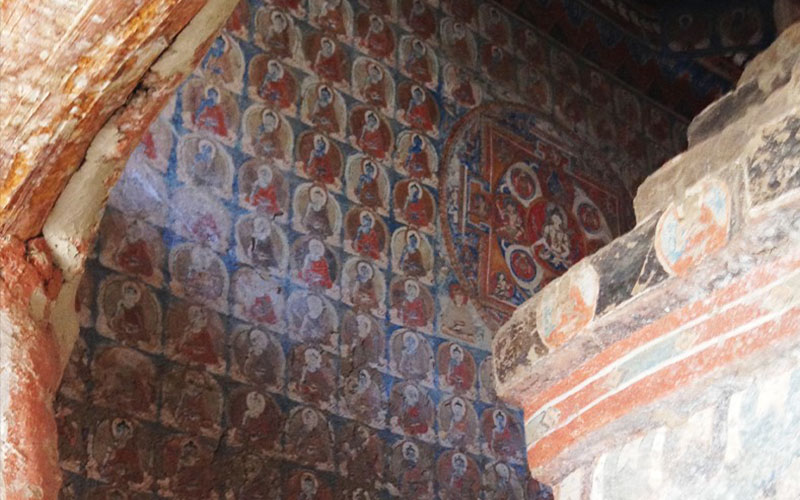
Alchi & Lamayuru
A day trip to Alchi and Lamayuru, two of Ladakh’s most ancient and revered monasteries. Alchi, known for its well-preserved 11th-century murals and intricate sculptures, is a window into the region’s Buddhist art and architecture. Lamayuru, often called the "Moonland" for its surreal landscape, is one of the oldest monasteries in Ladakh, dating back to the 10th century, with a fascinating legend of being blessed by a Lama, which caused the lake to recede and allowed the monastery to be built. Both are a must-visit for those seeking a deeper understanding of Ladakh's spiritual and cultural heritage.
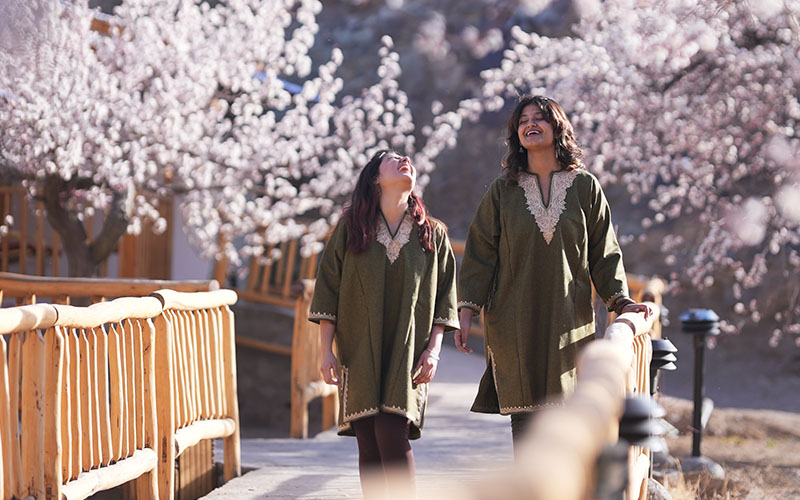
Apricot Bliss
The apricot blossoms of Ladakh are a sight to behold, usually blooming in early spring. These delicate white and pink flowers blanket the valleys, creating a striking contrast against the rugged, barren landscape. The blossoms bring a touch of colour and life to the otherwise arid terrain, symbolizing the resilience and beauty of Ladakh's natural world. It's a season cherished by locals and visitors alike, offering a unique glimpse into the region’s changing seasons.

Village Treks
Perched at an elevation of 3,000 meters, this secluded hamlet, home to fewer than seven households, lies about 70 km from Leh town. The 9 km guided round-trip hike offers panoramic views, with the highlight being a dramatic gorge that serves as the village's grand entrance. The hike takes around 4 hours, while the entire journey from the hotel and back requires approximately 6 hours.

Gymatsa Adventure Trails
Just 10 minutes from Leh town lies the charming settlement of Gymatsa, perched on the uppermost reaches of the region. A guided hike here promises both beauty and challenge, looping over a small but spirited pass that urges hikers to push beyond their limits. Though the trail spans only 4 to 5 km, the journey rewards you with spectacular views and the satisfaction of a true adventure..

Snow Leopard Spotting
High in the rugged mountains of Ladakh, the elusive snow leopard moves like a ghost across the rocky slopes. Camouflaged against the icy terrain, it watches unseen before melting into the landscape. Spotting one is a rare and magical moment—an encounter with the true spirit of the Himalayas.

Magical Monasteries
The Grand Dragon Ladakh arranges for a day trip to explore Ladakh’s unique monasteries [Gompas] -Shey, Thiksey, and Hemis synonymous with Ladakh’s rich Buddhist heritage, stunning architecture, and spiritual significance and a picnic lunch by the river Indus.
Shey offers royal history and a grand Buddha statue-Perched on a hillock overlooking the Indus River it features a blend of traditional Ladakhi architecture, and it is known for its multi-tiered construction, large windows, and whitewashed walls. Built in the 17th century by King Deldan Namgyal Shey was the ancient capital of Ladakh before Leh took over this role. One of the key attractions inside the palace is the 12-meter high statue of Shakyamuni Buddha, made of gilded copper, which is one of the largest Buddha statues in Ladakh. It also houses numerous murals and frescoes depicting Buddhist deities and scenes from the life of Buddha.
Thiksey is one of the largest and architecturally most impressive gompas. This 12-storey Tibetan-style structure resembles the Potala Palace of Tibet and is situated atop a hill that overlooks the Indus valley set against the magnificent backdrop of the Stok mountains. There are several temples in this gompa, containing exquisite images, stupas, thangkas and wall paintings of Buddha. One of the most popular attractions in the monastery is the Maitreya Temple with its 15 metre (49 ft) tall statue of Maitreya Buddha in a Lotus position and one of the largest statues in Ladakh covering two floors of the building.
Hemis the largest and the most important of all monasteries in Ladakh, this Tibetan Buddhist monastery of Drukpa lineage of Buddhism [ also known as Dragon Order of Mahayana Buddhism] was re-established in 1672 by the Ladakhi King Sengge Namgyal. Located on the bank of the river Indus, Hemis Monastery has beautiful architecture and one can pay homage to the two large statues of Lord Buddha and Guru Rimpoche. The annual Hemis festival in June , and a vibrant celebration in honour of Lord Padmasambhava, is a landmark event in the Ladakhi calendar and a draw for the spiritual and travellers alike.

Serene Shanti Stupa
Shanti Stupa, situated on a hillock in Chanspa, Leh, at a height of 3,609 metres, the Shanti Stupa was built by the Japanese Buddhist Monk, Bhikshu Gyomyo Nakamura and was inaugurated with the enshrinement of the relics of the Buddha by His Holiness the 14th Dalai Lama in 1985. . Do keep an evening free to enjoy the mesmerising sunset as well as the panoramic views of Leh city from the Shanti Stupa.

Dawn Devotions
Begin your day in serene harmony with the peaceful sounds of morning prayers at Ladakh's revered monasteries—Thiksey or Hemis . Let the rhythmic chants and sacred atmosphere uplift your spirit. Timings: 6:00 AM in summer and 7:00 AM in winter.
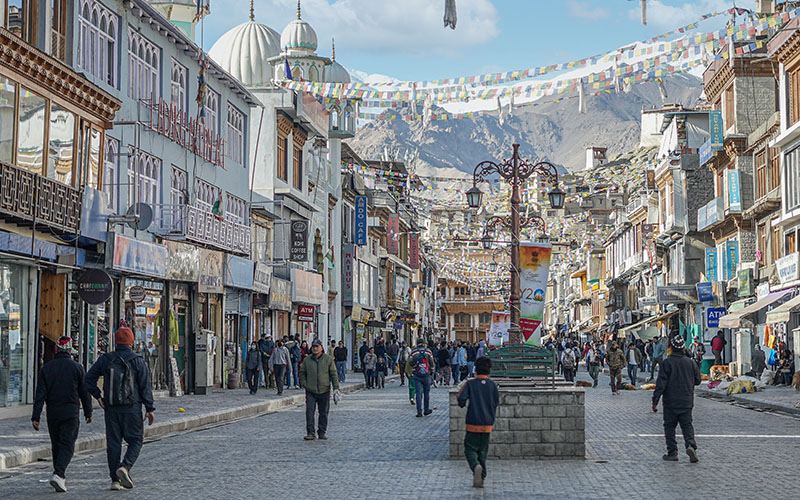
Shopping Paradise
Located in the heart of Ladakh, Leh Market, a short walk from The Grand Dragon Ladakh, is on every traveller’s to-do list. Bustling with life, it has a rich mix of traditional handicrafts, colorful textiles, local spices, and unique souvenirs. Studded with cozy cafes and local restaurants, it is perfect for a relaxing denouement to your trip!.
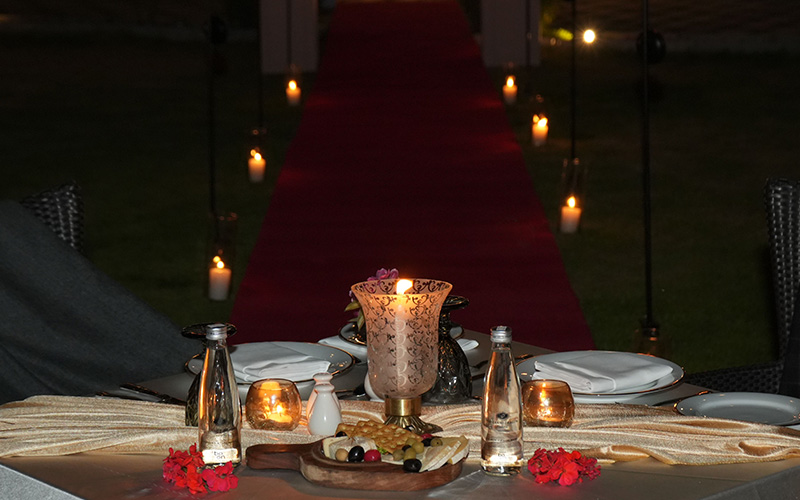
Candlelit Evenings
Set the stage for romance with a magical candlelight dinner for two, thoughtfully crafted by our chefs to match the mood. Dine under the stars beside a crackling fire, or opt for the privacy of your balcony or suite where stunning views of the majestic Stok Kangri range continue to fascinate . With your personalized playlist adding to the ambience, it’s an evening made for unforgettable moments.
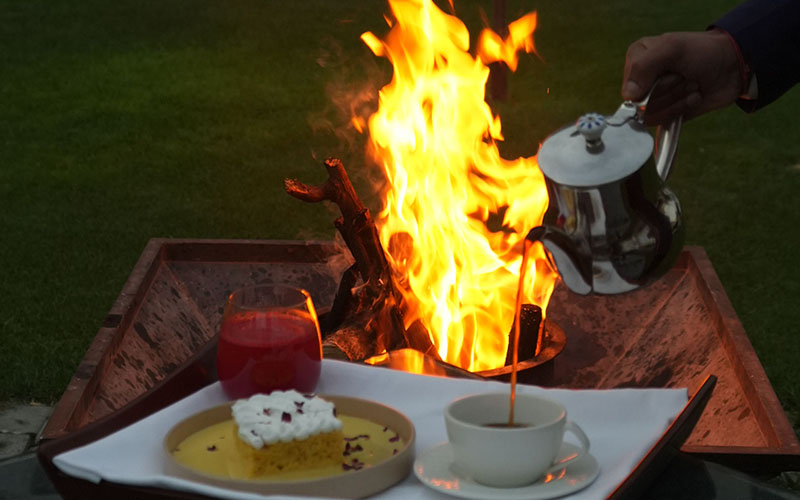
Flaming Feasts
A signature evening at The Grand Dragon Ladakh, the bonfire barbecue dinner is a must-try. Savour a delicious selection of starters, refreshing drinks, and a hearty soup, followed by a main course as per culinary preference — all enjoyed under the starlit sky.

Himalayan Art of Lettering
Try your hand at the beautiful art of Tibetan calligraphy with a monk or scholar specially arranged on request for inhouse guests.Watch as skilled hands bring ancient scripts to life with graceful, harmonious strokes, creating artistic expressions. Have fun learning to write your own name in this timeless style and return home with a personalised memento from Ladakh
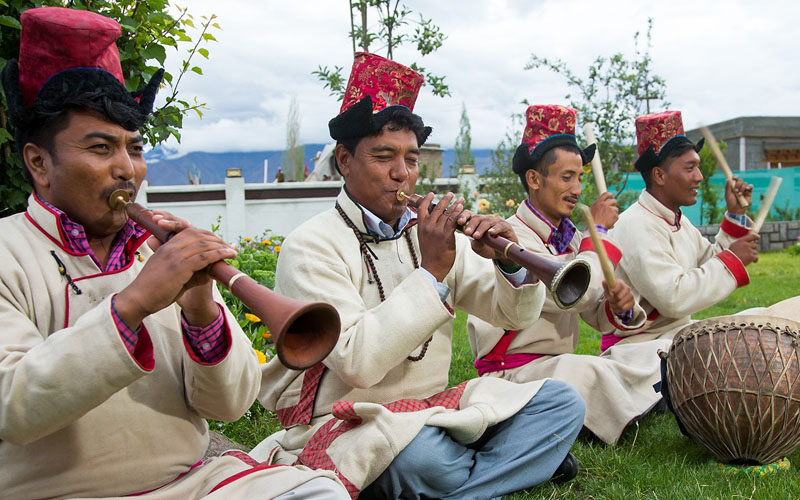
Cultural Chronicles
Experience the vibrant culture of Ladakh through its rich folk music and dance. Performers in colorful attire and ornate peraks (headpieces) showcase 5-7 traditional dance forms representing various tribes and festivals. As music fills the air, guests are invited to join in the joyful celebration. Performances can be arranged in the front or back garden, or indoors based on availability.
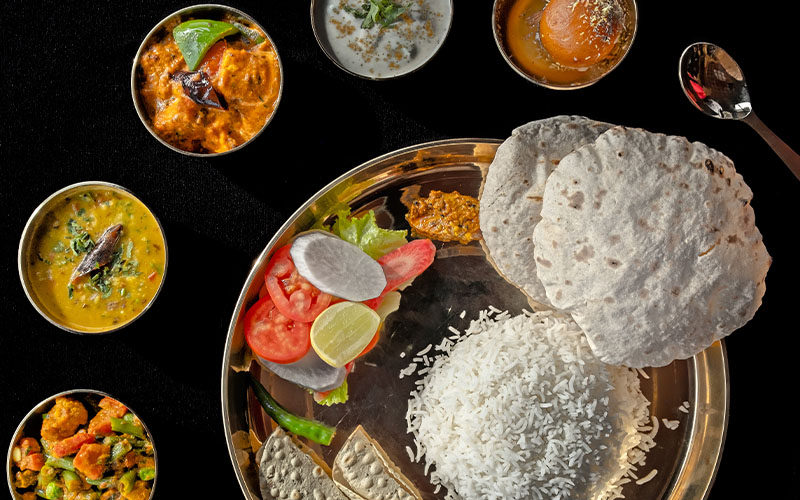
Culinary Classics
Not to be missed at The Grand Dragon Ladakh is the exclusive Ladakhi sit-down dinner at Tusrabs, the private dining room. Enjoy a local feast, served in a traditional Ladakhi-style setup. With personalized attention from gracious hosts sharing insights into the region's food, culture, and traditions, influenced by travellers on the ancient silk route from Tibet, China and the Middle East this dining experience offers a delightful taste of Ladakh's culinary heritage. Enjoy the vibrant flavors of neighbouring Kashmir, in the heart of Ladakh with a Wazwan - the Kashmiri wedding feast at Tusrabs, the private dining room. Savour signature dishes like Gushtaba (velvety meatballs in yogurt gravy), Rogan Josh (fragrant lamb curry), and Tabakh Maaz (crispy double fried ribs) served in elegant copperware. An absolute must for the culinary enthusiast.
